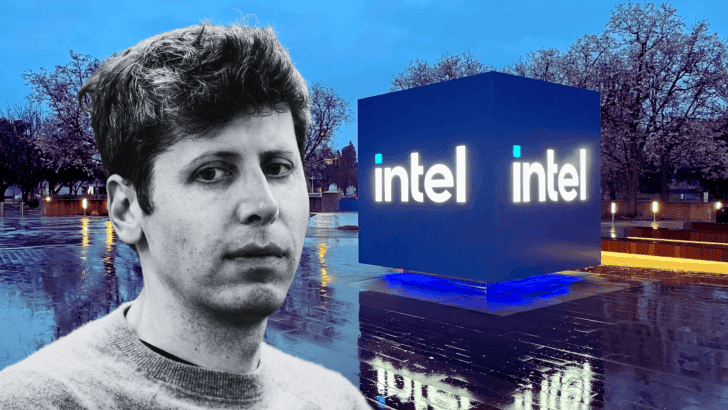OpenAI's Sam Altman Pursues Chip Independence with Secret TSMC Meetings
3 Sources
3 Sources
[1]
OpenAI's Sam Altman had secret TSMC meeting over future chip supply, report claims -- AI pioneer in Asia as South Korea confirms 20MW data center deal with ChatGPT maker
He followed it up with a trip to South Korea to announce data center builds with Samsung and SK Hynix. OpenAI CEO Sam Altman reportedly took a quiet trip to Taiwan this week to hold meetings with representatives of TSMC and Foxconn and discuss collaborating on chip design and manufacturing, as well as AI server infrastructure development, according to Digitimes. These kinds of partnerships will be crucial if OpenAI is to meet its commitments as part of major initiatives like Stargate, to build hundreds of billions of dollars worth of data centers and "AI factories," over the next few years. Although not announced by any of the involved companies or Altman himself, there's no denying he's in the region, as it was confirmed just one day later, Wednesday, September 30, that Altman had been in South Korea meeting with President Lee Jae Myung. Korea Times reported that he secured non-binding deals to build a 20-megawatt data center in Phang in partnership with Samsung, and another in the South Jeolla province with SK Hynix. The alleged meetings in Taiwan were arguably more important, however. Although Altman and OpenAI have been doing deals around the world to build out AI infrastructure, it needs many hundreds of thousands of chips to do it with, and TSMC and Foxconn are set to be major suppliers. TSMC is the world's largest and most advanced chip design and manufacturing company, while Foxconn is the largest supplier for Oracle, the cloud computing company that OpenAI has struck a deal worth $300 billion for compute power. Foxconn is an integral partner with Japanese investment vehicle Softbank, which is also heavily invested in OpenAI and a range of its data center projects. Foxconn will manufacture hardware for Softbank at the Ohio facility it sold to the company earlier this year. Altman's meetings with TSMC and Foxconn, if real and fruitful, likely further entrenched their cooperation on scaling up OpenAI's global AI infrastructure, as well as gaining deeper insight into TSMC's planned advanced process nodes for future chip designs. Another area likely discussed, and potentially more impactful for the future, is OpenAI's own chip design ambitions. As it stands, it relies on hundreds of thousands of expensive and power-hungry Nvidia GPUs. Alongside China and other countries and companies, OpenAI wants to untether itself from being so reliant on Nvidia moving forward, so it is developing its own AI application-specific integrated circuit (ASIC) chips for AI inference. OpenAI reportedly formed an ASIC design team in 2024 and is alleged to be working with Broadcom to develop a custom AI chip on TSMC's advanced 3nm process. Combining high bandwidth memory and advanced packaging technologies, OpenAI's bespoke hardware is expected to enter mass production in Q3 2026, following a recent delay.
[2]
OpenAI CEO Sam Altman Says Tech Giants Should Rely on TSMC to Expand Chip Capacity, Rather Than Collaborating With Intel
OpenAI's CEO has given his verdict on whether the tech giants should look towards an alternative to TSMC, such as Intel Foundry, and Altman claims he would rather stick with the Taiwan giant. The idea that Intel is a viable alternative to TSMC in semiconductor manufacturing has gained significant traction in the mainstream media, particularly following the collaboration between the US government and Team Blue. Personalities like NVIDIA's CEO Jensen Huang, AMD's CEO Lisa Su, Jim Keller, and now, OpenAI's CEO Sam Altman are being asked about whether they would see Intel as an option to consider alongside TSMC for their chip needs, and while many of them have responded with 'reserved' answers, Altman has taken a more straightforward approach. In an interview with Stratechery, here's what he had to say about Intel: Question: Well, with this, the problem with this is both Nvidia and AMD are sourced at the same place, so there's another solitary entity in the value chain, which is TSMC. Do you see a need and responsibility/opportunity to expand the market there as well? Is this something where when it comes to the question of Intel. Altman: I would like TSMC to just build more capacity. What did you think I was asking, about multi-chip suppliers? Altman: Do I see a need to get TSMC to expand their rate of investment in more capacity? Of course, when you look at OpenAI itself, the firm isn't involved in the manufacturing business up till now, but we do know that the tech giant is developing a dedicated AI chip, which is claimed to feature TSMC's 3nm process. Altman defintely knows a bit or two about the semiconductor supply chain, which is why his verdict around using Intel's foundry services do hold weight, but this isn't an outright rejection here, rather the statement of OpenAI's CEO indicates that the preference is here to rely on a consistent partner, instead of a dual-sourcing strategy. Interestingly, AMD's CEO was asked about using Intel as a foundry partner, and she, too, gave a rather uncertain response. Yet again, tech giants understand that committing to US manufacturing is a long-term goal for them, and relying on TSMC alone won't be enough. The Taiwan giant requires time and suitable logistics to shift a significant portion of its production from Taiwan to the US. To mitigate the existing supply constraints, a secondary chip partner is needed, whether it is Intel or Samsung. For now, tech giants would definitely be looking towards how Intel's 18A node pans out in terms of process efficiency, performance, and production volumes, since this will be one of the deciding factors towards whether the IFS is suitable to bear the flag of American manufacturing.
[3]
OpenAI's CEO Sam Altman Pays a 'Secret Visit' To Taiwan, Reaching Out to TSMC For Its In-House AI Chip Which is Slated For 2026
OpenAI's CEO has recently visited Taiwan, making crucial stops at TSMC and Foxconn to discuss the company's AI projects, including Stargate and its pursuit of ASICs. OpenAI is currently in the pursuit of rapidly expanding its compute capabilities, whether it is striking 'multi-billion' dollar deals with the likes of NVIDIA and Coreweave for AI hardware, or even working towards its custom AI chips. Now, in a new report by the Taiwan Economic Daily, it is revealed that OpenAI's Sam Altman has paid a visit to Taiwan, discussing matters related to its highly ambitious Stargate project with Foxconn, as well as visiting TSMC to explore their self-built AI chip plans. For those unaware, Foxconn is set to be one of the largest suppliers for NVIDIA's rack-scale solutions, which will power the Stargate project. This project plans to open several data centers, involving partners such as OpenAI, Oracle, and SoftBank. Stargate is valued at around $500 billion and is projected to be America's biggest venture in terms of computing power. Altman's visit to Foxconn would likely be to discuss AI server production capacities, as well as how the Taiwanese firm would contribute to developing the mega AI infrastructure. The more important visit is around Altman and TSMC, as the report indicates that OpenAI's CEO has discussed the company's pursuit of developing AI chips. Initially, the custom AI chip project was expected to be co-developed with Broadcom. However, now that AI giant OpenAI has recruited individuals from Google's TPU project, it appears that OpenAI will likely take chip design into its own hands, eventually putting it up for manufacturing at TSMC. Specifications of OpenAI's custom chip are uncertain; however, it is speculated that the firm will utilize TSMC's 3nm process, with integration expected by 2026. OpenAI's ASIC will mark the first 'demonstration' of custom chip projects from Big Tech that could pan out, relative to NVIDIA's offerings, hence it is undoubtedly a huge deal.
Share
Share
Copy Link
OpenAI CEO Sam Altman's recent visits to Taiwan and South Korea signal a strategic push for chip supply and AI infrastructure development. The meetings with TSMC and Foxconn highlight OpenAI's ambitions to secure future chip supply and develop custom AI chips.
OpenAI's Strategic Moves in Asia
OpenAI CEO Sam Altman has recently made significant moves in Asia, signaling the company's ambitious plans for chip supply and AI infrastructure development. Altman reportedly held secret meetings with Taiwan Semiconductor Manufacturing Company (TSMC) and Foxconn in Taiwan, followed by a visit to South Korea
1
.
Source: Wccftech
Securing Future Chip Supply
The meetings in Taiwan focused on potential collaborations in chip design, manufacturing, and AI server infrastructure development. These partnerships are crucial for OpenAI to meet its commitments in major initiatives like Stargate, which aims to build hundreds of billions of dollars worth of data centers and "AI factories" over the next few years
1
.South Korean Partnerships
In South Korea, Altman secured non-binding deals to build a 20-megawatt data center in Phang in partnership with Samsung, and another in the South Jeolla province with SK Hynix. These agreements further solidify OpenAI's commitment to expanding its global AI infrastructure
1
.Related Stories
Custom AI Chip Development
A key focus of Altman's discussions with TSMC likely revolved around OpenAI's ambitions to develop its own AI application-specific integrated circuit (ASIC) chips. The company aims to reduce its reliance on expensive and power-hungry Nvidia GPUs by creating custom hardware tailored for AI inference
3
.OpenAI reportedly formed an ASIC design team in 2024 and is working with Broadcom to develop a custom AI chip using TSMC's advanced 3nm process. The chip is expected to enter mass production in Q3 2026, following a recent delay
1
.Preference for TSMC
In a recent interview, Altman expressed a clear preference for TSMC to expand its chip production capacity rather than collaborating with Intel. When asked about the potential need for alternative chip suppliers, Altman stated, "I would like TSMC to just build more capacity"
2
.
Source: Wccftech
This stance highlights OpenAI's commitment to working with established partners like TSMC, rather than pursuing a dual-sourcing strategy that might include Intel's foundry services. However, as the demand for AI chips continues to grow, the industry may need to consider diversifying its manufacturing base in the long term.
References
Summarized by
Navi
Related Stories
TSMC Executives Reportedly Dismissed OpenAI's Sam Altman as 'Podcasting Bro' in Chip Venture Talks
28 Sept 2024

OpenAI Nears Completion of Custom AI Chip to Reduce Nvidia Dependence
10 Feb 2025•Technology

OpenAI's Sam Altman Embarks on Global Fundraising Tour for Massive AI Infrastructure Expansion
04 Oct 2025•Business and Economy

Recent Highlights
1
ByteDance Faces Hollywood Backlash After Seedance 2.0 Creates Unauthorized Celebrity Deepfakes
Technology

2
Microsoft AI chief predicts artificial intelligence will automate most white-collar jobs in 18 months
Business and Economy

3
Google reports state-sponsored hackers exploit Gemini AI across all stages of cyberattacks
Technology





